#betrayals of trust are complex
Text
actually so evil how much of hal's internal world gets obliterated with the rewriting of his relationships with jessica and martin.
#hal jordan#empyrean posting#ok going in the tags because im not actually v confident in my understanding of his character. i read all of his 80s/90s stuff but forgot#90% of it but ANYWAY.#so much of him just does not make sense with how geoff johns characterises him and his relationships with his parents particularly the#parallax stuff simply because of how much his relationship with the guardians and their apathy/'betrayal' is influenced by hal's original#relationship with his dad. like at its heart it's pretty much the same dynamic in how hal blindly trusts and sort of idolises the guardians#despite their repeated infractions in hope of... something in return just as he had with his father and the abuse he suffered at martin's#hands. that's what makes his anger at the guardians make sense when it does show itself because the relationship parallel didn't stop there.#as with martin hal gets nothing for his devotion. he gets nothing for doing everything that's asked of him and more and it ends the same way#too: with a man in the sky burning like a newborn star. and you lose so much of that nuance and intrigue behind that if you just make#jessica the 'bad one' because!!! you cheapen it!!!!#the whole idea of hal is that he has his father's face but his mother's scars#(to me). in the sense that they both reacted to martin the same way with that cognisance of who he was as a man yet inability to pull away#because... love. both the love they had for him and the conviction that he did or could love them too. and jessica arguably did eventually#but also she didnt did she? because she held onto that notion of love till the very end. the few scraps she had she ballooned outwards until#they became the whole. but hal didnt have even that and he spent his whole life chasing it & running away from wanting it at the same time#like i think there's something so interesting to the fact that he had to be convinced that flying was what he wanted to do. how much of that#was touched by his father? the fear that he was already too much like him than he could bear to be? he already had his face now he had his#dreams and longing for the sky. how much more could he have before he began repeating the cycle?#and at the end he even had his father's death. burning in the clouds. like there's so much there and that's not even touching on how it#impacts his relationships with other heroes. not just in the sense of why did kyle clark and diana get to keep their close yet complex#relationships with their moms when hal had to lose his (although yeah why did they) but also just how he lets himself come across to them.#because it's on purpose right? that he lets them think his reflection of his father is born out of unadulterated love for a man worthy of it#? he has his father's job he wears his father's jacket he smiles his father's smile. what else are they supposed to think.#and isnt that interesting!!! that this man who is so committed to being good & just can lie so casually to people he thinks of as friends!!!#can you see how that might be his mother through and through!!! in how she might have glossed over the abuse to other people and herself!!!#can you see how in spite of it all he might want to be perceived as his father that paragon of masculinity and resent that he is not!!!#do you understand how everything he loves has been poisoned!!! im thinking of that scene where he tells bruce about watching martin die &#wouldnt it have been so much more interesting through this lens. how he is both revealing & obfuscating at once. i hate the change sm
19 notes
·
View notes
Text
I look for betrayal a lot in people around me, and as soon as I see them do the most normal insignificant thing that I subconsciously define as betrayal, my mind goes “Ahh, I knew it. I knew I couldn’t trust you.”
That then leads me to completely cutting that person off as that “warning sign” is enough to make me abandon them before they betray me. It takes conscious effort for me not to be irrational and take the smallest things as betrayal.
#What do I tag this as?#betrayal trauma#ptsd#cptsd#paranoia#schizospec#trust issues#complex ptsd#actually ptsd#trauma survivor
7 notes
·
View notes
Text
who up thinking about the complex religious psyche of primoz roglic 🤐
#giant cross tattoo. crossing himself before every TT.#god failing to protect him time and time again and yet he blesses himself and prays anyway……#failure of the deity steadiness of the flesh#betrayal of the divine trust in the body#⚠️ post written by gay person survivor of evangelism w a complex need to poeticize religious suffering#hhhhhhh it just . yeah
5 notes
·
View notes
Text
the way i’ve seen utena’s realization -> acknowledgement of akio’s abuse of anthy talked about on here sometimes really rubs me the wrong way. i think people can be extremely uncharitable to utena (14 year old!!) in this regard, simply by virtue of the fact that the narrative unveils this abuse to us far earlier than utena is even placed in close proximity to that dynamic.
because not only is she a child deeply romanticizing the idea of family (and it’s associated ties w unconditional love) due to her own past losses, but she is also being actively groomed by the same man abusing anthy.
there’s absolutely an element of willful blindness and naivety to how she shies from the truth of that abuse, but the idea that she’s some idiot, too clueless and dumb to see a truth anthy herself isn’t even articulating to her is just uncompassionate.
#akio flatters utena. makes her feel welcomed and desired in a family unit she envies.#he's a charming and cunning ABUSER#and the average 14 year old is in fact GOING TO FUCKING SHY AWAY FROM EVEN THINKING THAT THIS OLDER MAN SHE WANTS TO TRUST IS HURTING HIS#YOUNGER SISTER#WHOM UTENA IS STRUGGLING W HER FEELINGS FOR#LIKE. guys come the fuck on now#tunes talks utena#it's not to say her reaction to that abuse doesnt veer into cruelty. going w akio the morning after because she felt a complex mix of#betrayal (it's left unsaid about WHAT she feels betrayed but an aspect is absolutely being led under duress on anthy's part into the#vacinity of a man who HURTS HER) and anger. but by god. some takes on this website#tunes talks critical
15 notes
·
View notes
Text
I had a dream that I beat up an ex friend who secretly hated me for 3+ years and used me for weed, money, food, attention, etc… and when I told my therapist about it he took a moment and said “I mean that’s a fair reaction to what they put you through” WILLIAM???? Sir???
#I was expecting like ‘Siara you really have to let go of the past and let yourself heal’#and good ole will was like nah let that bitch burn in ur dreams#also though like the science behind betrayal trauma is wild#and now I’m like wait it actually wasn’t normal for someone to become my best friend and hang out every day while actively hating me 😭😭😭#anyways#a bitch has trust issues!!!#therapy#complex ptsd#love my therapist for validating me cutting everyone off related to him bc I was being gaslit into believing this was like high school drama#and not like. trauma AGSHSJSKS
0 notes
Text
20 Emotional Wounds in Fiction That Make Readers Root for the Character
Abandonment: Characters who have been abandoned by loved ones or caregivers can evoke sympathy from readers.
Betrayal: Being betrayed by someone close can create deep emotional wounds that make readers empathize with the character.
Loss of a Loved One: Whether through death or separation, the loss of a loved one can be a powerful emotional wound.
Rejection: Characters who experience rejection, whether in relationships or by society, can be relatable and evoke empathy.
Abuse: Physical, emotional, or psychological abuse can create complex wounds that shape a character's personality and behavior.
Neglect: Characters who have been neglected, especially in childhood, can evoke sympathy from readers.
Failure: Experiencing a significant failure or loss can create emotional wounds that make characters more relatable.
Guilt: Characters who carry guilt for past actions or decisions can be compelling and evoke empathy from readers.
Shame: Feelings of shame can create internal conflict and make characters more relatable and sympathetic.
Injustice: Characters who have experienced injustice or unfair treatment can evoke strong emotions from readers.
Trauma: Characters who have experienced traumatic events, such as war or natural disasters, can be sympathetic and relatable.
Loneliness: Characters who feel lonely or isolated can evoke empathy from readers who have experienced similar feelings.
Fear: Characters who face their fears or struggle with phobias can be relatable and evoke empathy from readers.
Self-doubt: Characters who struggle with self-doubt or low self-esteem can be relatable and evoke sympathy.
Identity Crisis: Characters who are grappling with questions of identity or struggling to find their place in the world can be sympathetic.
Addiction: Characters who struggle with addiction can be complex and evoke empathy from readers.
Betrayal of Trust: Characters who have had their trust betrayed can be sympathetic and relatable.
Unrequited Love: Characters who experience unrequited love can be sympathetic and evoke empathy from readers.
Isolation: Characters who feel isolated or disconnected from others can be relatable and evoke sympathy.
Fear of Failure: Characters who struggle with a fear of failure can be relatable and evoke empathy from readers.
#writing tips#writing advice#writers on tumblr#writeblr#creative writing#fiction writing#writerscommunity#writing#writing help#writing resources#ai assisted
9K notes
·
View notes
Text

Nooooo wayy this sure isn't gonna come back around and be extremely relevant to the plot of this game
#maruki is a great character to experience on a replay... like yea.. betrayal hurts. like how u trust ur therapist and he uses u#to fuel his god complex#luna speaks#im replaying p5r cause im normal and sane. im also sick rn
0 notes
Text
Some examples of challenging obstacles for characters to face
Personal Tragedy, The sudden loss of a loved one throws the protagonist into a state of grief and despair, forcing them to navigate the complex emotions of mourning while still grappling with their responsibilities and goals.
Betrayal, A trusted friend or ally betrays the protagonist, revealing hidden agendas or turning against them at a critical moment, leaving the protagonist feeling betrayed and alone, and forcing them to reevaluate their relationships and alliances.
Physical Limitations, The protagonist suffers a debilitating injury or illness that threatens to derail their plans and ambitions, leaving them physically weakened and vulnerable, and forcing them to find new ways to adapt and overcome their limitations.
Social Prejudice, The protagonist faces discrimination or prejudice based on their race, gender, sexuality, or social class, making it difficult for them to achieve their goals and forcing them to confront systemic injustice and inequality.
Impossible Choices, The protagonist is faced with a series of impossible choices, each with its own moral or ethical consequences, forcing them to weigh the lesser of two evils and grapple with the fallout of their decisions.
Internal Conflict, The protagonist battles with their own inner demons, such as addiction, trauma, or mental illness, which threaten to sabotage their efforts and undermine their sense of self-worth and purpose.
Rivalry, The protagonist finds themselves locked in a bitter rivalry with a formidable adversary, such as a rival athlete, business competitor, or romantic rival, pushing them to their limits as they strive to outmaneuver and outwit their opponent.
Existential Crisis, The protagonist wrestles with profound existential questions about the meaning of life, the nature of reality, and their place in the universe, confronting their own mortality and searching for purpose and meaning amidst the chaos and uncertainty of existence.
#writing#writer on tumblr#writerscommunity#writing tips#character development#oc character#writing help#creative writing#writing block#writing advice#writer tumblr#writing prompt
4K notes
·
View notes
Text
Some humans betray those who love them and love those who betray them.
#humans#betrayal#love quotes#love poem#paradox#human nature#complexity#relationships#trust#distrust#psychology#sociology
1 note
·
View note
Text
An analysis on how Sir Pentious' character design represents his personality and development perfectly (beware of Hazbin Hotel spoilers)
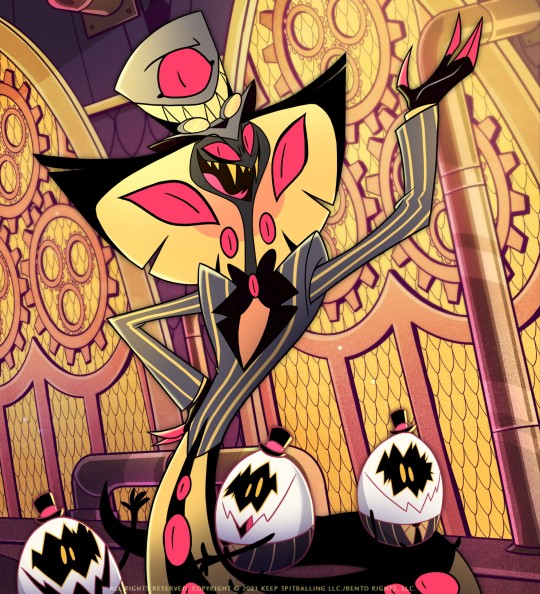
Let's get this out of the way: Sir Pentious is a snake, an animal mostly known for generally believed negative traits such as poison, deceit and betrayal. We don't know WHY he's in Hell, maybe he was a "snake oil salesman" considering he comes from the Victorian times and he's into hyping up what he does, or maybe he was into war. Thing is, he's a Sinner whose design just scream "Evil".
(BTW, a snake could also represent "fertility": looking at you, Egg Boiz!)
He always had eyes all around him not just because of a stylistic choice.
Sir Pentious always felt like he was watched, and had to watch out for any danger.
"Everyone here is too nice: obviously it must be a lie! I can sense they are planning to kill me, but when?! HOW?! I must be PREPARED!"
Sadly, he's been constantly berated by other demons, far more effective in destruction, status, cruelty and charisma. Alastor won't ever bother to remember him, Cherri always ones up him, and the Vs, the ones he admires to most, won't care less about him.
To the point that Vox sent him as a spy without the intention to save him if things were going to fail. Heck, he even openly tells him to die while calling him a failure.
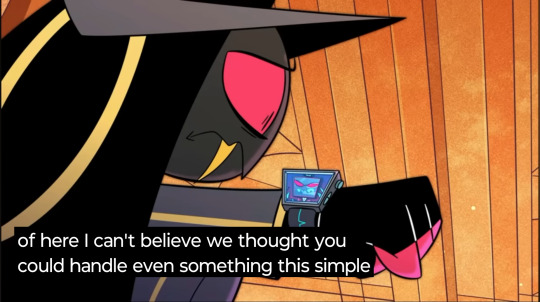
So of course he's got reasons to have trust issues, or taking everything so seriously, being constantly reminded of what he can't accomplish. So he puts an air of grandure that may be very flamboyant, but is VERY frail.
But, if we have to be frank here, his biggest source of insecurities... is himself.
He has eyes on his tail (his softer, more vulnerable side, which is ironically made even MORE lieable to getting hurt because of how sensitive those organs are), and inside his hood, so he could look out better for danger when on alert mode.
Heck, even the mark on his hood kinda resembles one eye.
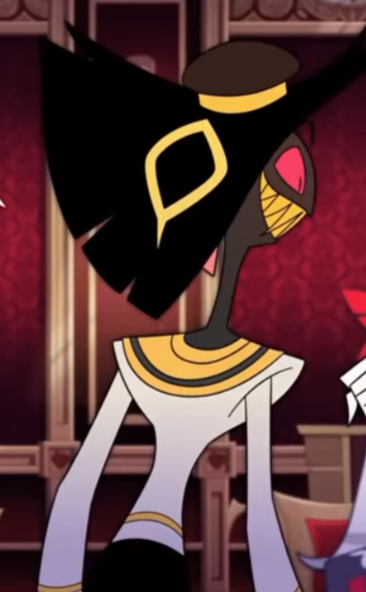
Problem is, when you see his hood folded, when he's at ease, neutral or sad, those are not looking at outside sources.
They're looking at him, at his back. A constant stare that happens everytime he lets his guard down and shows how vulnerable he is. A gaze that can sense all of his weakness, his struggles, his insecurities.
And it's all him.
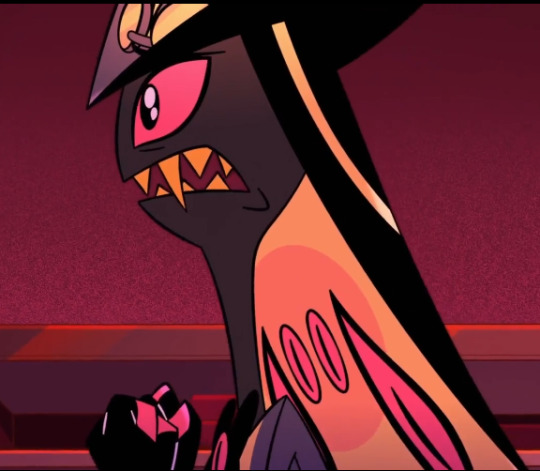
Pentious constantly believes that his inferiority complex will fade away once he'll accomplish something grand that will make others accept him. But he is his biggest critic, his worst enemy: HE is the one who believes he's a failure, that he'll never gain approval from others.
This show takes place in Hell, but this is Sir Pentious' personal Hell: insecurity born out of self hatred. Doomed to feel everyone's gaze upon him, including his own. Believing the danger to his self esteem is from others, when it's really from him.
But then he's accepted at the Hazbin Hotel: Charlie forgives him, he bonds with Angel, Husk and Niffty who don't care a bit about what he's accomplished or not, or what he's done in the past.

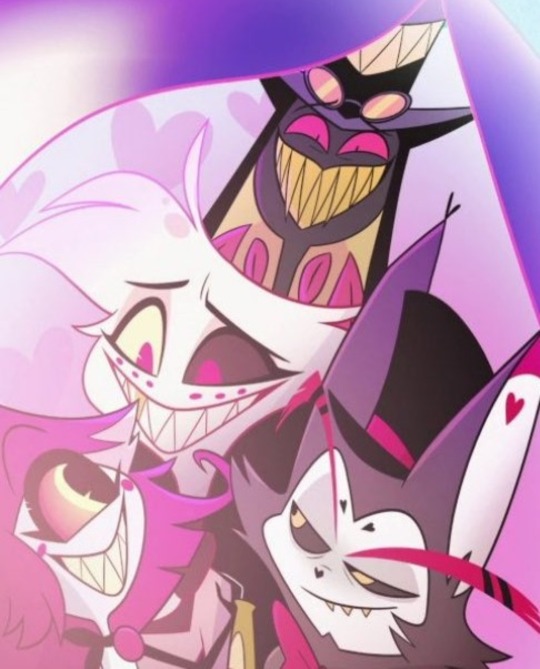
He feels more comfortable in showing his vulnerable side, and no one judges him for how easy it is for him to get emotional.
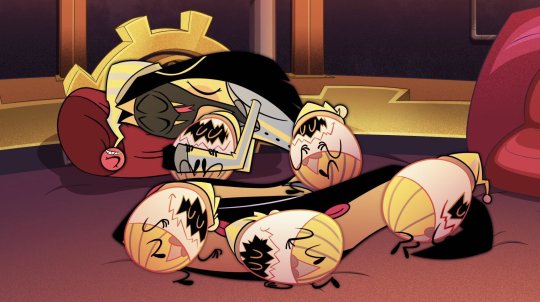

Of course he's still very insecure, considering how he struggles to confess to Cherri, but notice how he stops building machines or planning to attack others as soon as he starts bonding with the others: he doesn't have a reason to destroy or attack, now that he knows he's loved.
And his final design, when he goes to Heaven, shows how much he's changed, yet stayed the same. He may have died a hero, but he's still the same awkward snake we've come to love.
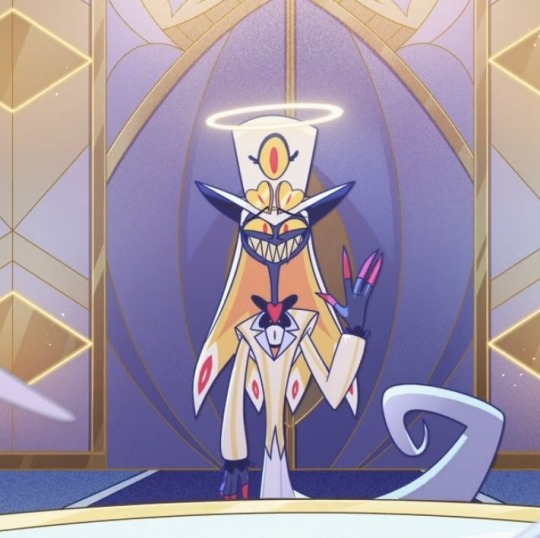
Speaking of love, let's talk about that!
No more eyes on his tail, now it's just on his chest (showing he's opened his heart), his glasses are now heart shaped, and even the markings inside his hood resemble kiss marks more than anything else.
And look: the mark on his hood is now heart shaped!
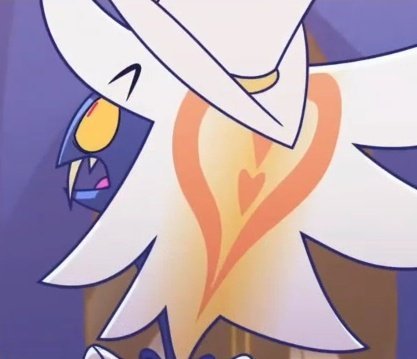
Why all these hearts? Why did all the eyes disappeared from his body? Even his eyes that were looking at his back?
Simple: love. Love defeated his insecurities and self hatred. He died for love.
He died protecting his friends, his new family, his new home.
He confessed and kissed Cherri knowing full well he wouldn't have made it, and yet he went anyway.
The usually cowardly and timid Pentious actually faced a great danger with courage and determination: he acted selflessly by putting himself in harm's way, he didn't steal (naturally) and by going against Adam he did indeed "stick it to the man"!
He used his weaponry knowhow and battle experience not to conquer, but to save his loved ones.
His only thought up until his demise was: "I'll go down protecting them".
And he's been rewarded not only by becoming an angel, but also being spawned directly in front of Emily and Sera, two Seraphim, the highest rank for an angel to have, who have also been depicted as snakes of fire throughout history! Sir Pentious, the lowly demon considered a failure by everyone, actually has been noticed by the Seraphim! He's come so far!
He's now come to represent the REAL symbolism of a snake: the duality of death and rebirth, transformation and immortality (ironically a reference to the fact he's been around since 1888 without ever dying from any Extermination or blessed weapons).
And isn't so poetic that a snake, the "source of the original evil", was the first sinner to ascend to Heaven? Or that this episode was released on February 1st, or National Serpent Day?
And of course, as the Bible itself says:
"Greater love has no one than this: to lay down one’s life for one’s friends."
(John 15:13)
And knowing him, I'm confident in saying he'll keep helping his friends even in his new position, like the soft hearted noodle he's always been, but was to afraid to show it up until now.
#Vivziepop#Hazbin Hotel#Hazbin Hotel Spoilers#Hazbin Spoilers#Sir Pentious#Fave Character#Comfort Character#Personal Rambles#What a wonderful lovable character he turned out to be 🥲#Character Analysis
3K notes
·
View notes
Text
How to Write Betrayal
Betrayal is a powerful plot element that is represented in countless stories. The gravity of betrayal brings a profound depth to character dynamics, plots, and themes alike, making it an indispensable tool for writers to explore emotions, conflicts, and the complexities of human nature. Let’s explore some quick tips on how to write betrayal!
Behaviour
Secretive actions
Dishonesty
Becoming emotionally distant
A sudden change in routine
Pushing people away
Nervous or fidgety movement
Frequent lying or making up stories
Unexpected aggression or irritability
Unjustified mood swings or emotional outbursts
Increasingly defensive
Interactions
Disturbed interpersonal relationships
Frequent misunderstandings or fights
Withholding information
Avoiding personal discussions
Insincerity in conversations
Frequently cancelling or missing plans
A sudden shift in relationship dynamics
Quick to deflect or place blame
Frequent subject changes
Gradual emotional detachment
Body Language
Avoiding direct eye contact
Defensive stance and crossed arms
Covering mouth or touching face
Shuffling or restless movements
Forcing smiles or laughter
Constantly looking around or at the ground
Stiff, tense posture
Heavy breathing or frequent sighing
Avoiding touch or skin contact
Exaggerated gestures
Attitude
A lack of concern or empathy
Increasingly personal and hurtful arguments
Erratic or unpredictable reactions
Self-centeredness
Insincerity
Dismissive or negative attitude
Callous disregard for other's feelings
A negative or pessimistic outlook
Inability to handle criticism
Withdrawal from relationships
Positive Story Outcomes
In the wake of a betrayal, a story can manifest various positive outcomes that add depth to the plot and its characters. Relationships can be strengthened, showing their resilience. Characters may discover newfound self-reliance and learn valuable lessons about trust and forgiveness, leading to an increase in empathy and understanding, personal growth, and the reinforcement of personal values. These experiences can encourage a clearer understanding of personal boundaries, prompt self-reflection, introspection, and the development of healthier coping mechanisms. Ultimately, these positive outcomes can bring about improved communication and honesty, forming the silver lining in the cloud of betrayal.
Negative Story Outcomes
The aftershocks of betrayal can reverberate throughout your story. This might include an irreparable fracture of trust and damage to relationships. Betrayal can trigger psychological trauma, leading to an increase in suspicion and insecurity. Feelings of inadequacy or self-blame may surface, and characters can experience a heightened sense of isolation. The fear of forming new relationships or trusting others can become overwhelming. There may also be an escalation of conflict or violence and the reinforcement of negative behaviours or patterns. Damaged self-esteem or self-worth may be another repercussion, and this can encourage destructive coping mechanisms.
Helpful Synonyms
Treachery
Deception
Double-crossing
Duplicity
Backstabbing
Two-faced
Disloyalty
Unfaithfulness
Infidelity
Falseness
Perfidy
Treason
Fraud
Deceit
Slander
Misrepresentation
Falsification
Chicanery
Double-dealing
#writers#creative writing#writing#writing community#writers of tumblr#creative writers#writeblr#writerblr#writing inspiration#writing tips#writblr#writers corner#writing quick tips#quick writing tips#writing resources#writing advice#writer#on writing#writers block#beat writers block#let's write#writing betrayal#writing emotions#character development#writing characters#advice for authors#references for writers#helping writers#writing help#help for writers
6K notes
·
View notes
Text
trod au ramble u can ignore
when i say slowburn in an enemies to friends to lovers for Trod I mean slowburn. 300k before Narinder even openly admits he cares for the Lamb, and Lamb actually opens up more than just a shield of positivity and another 100k of character growth, drama, complicated intricacies of grief and anger to communication. The Lamb has boundaries and sticks by them constantly in trod, they're not a pushover, but they don't blow up and react in explosive anger the same way that Narinder does and they are mistaken for soft by him for it, when it's him having to be the one who is constantly re-evaluating his priorities and his behavior because the lamb isn't taking shit from him, despite patience and love, and he's put in this position where he's allowing the grief and the hurt to keep hurting himself and the Lamb in the process, until he risks losing them and Narinder makes the active decision to work on himself. They HAD a healthy, wonderful friendship before, he cared for them. He still does. He wishes he didn't but god he still does.
but i dislike when characters do one change or have one realization and suddenly they're super nice. no I want them to be continuously complex. I want their bad habits and miscommunication to not instantly or quickly disappear, I want continuous effort from the wronger. do you hear me. CONTINUOUS EFFORT. that means a character fucking up again and again and relasping and changing and cursing and being like well he doesn't need to be any different because its not his fault then going back and being like. no. it was my fault. i am wronged and I am the wronger. i need complexities. Let us not forget the definition of 'enemy' in the enemies to friends to lovers here. if they start off soft then where is the growth. Where is the room for growth I want. Where is it.
they get to the processing of emotions they haven't allowed themselves to feel properly for centuries to take this friendship gone sour by betrayal, plagued by anger and hurt to something slowly blooming back into trust and care and soft until eventually its this healthy love of these uberly overpowered pair of gods
Trod bad end is when Narinder just speed runs the 'rehabilitation' part of the rehabilitation of death' and it circles back to him going feral in the head. Still an asshole? okay your lamb is gone. regret your pride and ego because the patient love you were afforded is gone forever and the last memory you gave them was not the love you could have given them but it will be the love that destroys mortality to get them back.
amnesia au Narinder is just happy to be here. no betrayal, no angst. eventually when his memory does return and he gets caught pretending he doesn't remember just so he can be sweet to them without his pride in the way will force a conversation that will essentially fix the horrific communication these two have. speedrun trod x2
Current Trod Narinder is a emo angsty bastard who's rightfully hurt at being imprisoned and (in his heart) betrayed by someone he trusted dearly (again) while Post-Trod Narinder is still a feral bastard but with truly un-constipated, true equal love for the Lamb that wears a wedding ring made of his own blood to the tune of 'i miss my wife tails' and got a praise kink
but if its not absolute hell getting to that point then WHAT IS THE POINT
and all these are mostly about Narinder but don't even get me started on the Lamb's issues. That sheep thang is hiding shit.
Except I can't talk about the Lamb's hiding issues Too Much yet unless you've been in my art streams and have seen some of my comics, then IYKYK but aaaaaaaaaaUUUUUUUUUUUUUUUUUUUUUUUUUUUUUUHG
#hi i feel like rambling about au today#cw for suggestive joke#feeling cute might delete this later#sara shush#trod au#the rehabilitation of death#writings#<for tag sorting
1K notes
·
View notes
Text
Creative misfortunes for characters
Identity Crisis: Have your character lose their memory, forcing them to rediscover their true self and past.
Betrayal by a Loved One: A close friend or family member betrays the character's trust, leading to emotional turmoil and inner conflict.
Physical Transformation: Give your character a physical ailment or transformation that they must come to terms with, such as sudden blindness, a debilitating illness, or turning into a different species.
Unrequited Love: Make your character fall deeply in love with someone who doesn't reciprocate their feelings, causing heartache and a quest for self-discovery.
Financial Ruin: Strip your character of their wealth and privilege, forcing them to adapt to a life of poverty and face the harsh realities of the world.
False Accusation: Have your character falsely accused of a crime they didn't commit, leading to a desperate quest to clear their name.
Natural Disaster: Place your character in the path of a devastating natural disaster, such as a hurricane, earthquake, or tsunami, and force them to survive and rebuild.
Loss of a Sense: Take away one of your character's senses (e.g., sight, hearing, taste) and explore how they adapt and cope with this profound change.
Forced Isolation: Trap your character in a remote location, like a deserted island, and make them confront their inner demons while struggling to survive.
Haunted Past: Reveal a dark secret from your character's past that comes back to haunt them, threatening their relationships and well-being.
Time Travel Consequences: Send your character back in time, but make them inadvertently change a crucial event in history, leading to unintended consequences in the present.
Psychological Breakdown: Push your character to the brink of a mental breakdown, exploring the complexities of their psyche and their journey towards recovery.
Unwanted Prophecy: Have your character be the subject of a prophecy they want no part of, as it places them in grave danger or disrupts their life.
Loss of a Loved One: Kill off a beloved character or make your protagonist witness the death of someone close to them, igniting a quest for revenge or justice.
Incurable Curse or Disease: Curse your character with an incurable ailment or supernatural curse, and follow their journey to find a cure or accept their fate.
Sudden Disappearance: Make a character disappear mysteriously, leaving the others to search for them and uncover the truth.
Betrayal of Morals: Force your character into a situation where they must compromise their ethical values for a greater cause, leading to moral dilemmas and internal conflict.
Loss of a Precious Object: Have your character lose a cherished possession or artifact that holds sentimental or magical significance, setting them on a quest to recover it.
Political Intrigue: Place your character in a position of power or influence, then subject them to political intrigue, manipulation, and power struggles.
Existential Crisis: Make your character question the meaning of life, their purpose, and their place in the universe, leading to a philosophical journey of self-discovery.
Remember that misfortunes should serve a purpose in your story, driving character growth, plot development, and thematic exploration.
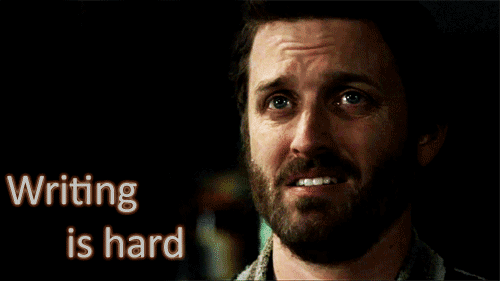
#writing#writing advice#writers block#just writer things#creative writing#fanfiction writing#writing motivation#writeblr#original writing#writing reference#writing tips#writers on tumblr#writing resources#writing tip#writing encouragement#writblr#writing community#writers#world building#point of view#editing#character creation#dialogue#mine.#words
3K notes
·
View notes
Text
Common misfortunes for characters
Death of a loved one: This can be a profound and devastating experience for a character, leading to grief, guilt, and a sense of loss. It can also serve as a catalyst for character development and exploration of themes such as mortality, coping with loss, and the fragility of life.
Serious illness or injury: Physical or mental health challenges can test a character's resilience and force them to confront their limitations. It can also provide opportunities for exploring themes of perseverance, the importance of support systems, and the fragility of the human body.
Loss of a job or financial ruin: Financial struggles can lead to desperation, uncertainty, and a loss of identity for a character. It can also present opportunities for growth, reinvention, and exploring themes of resilience, resourcefulness, and the true value of material possessions.
Betrayal by a trusted friend or ally: Betrayal can shatter trust and lead to feelings of anger, betrayal, and a loss of faith in others. It can create complex moral dilemmas for the character and explore themes of loyalty, forgiveness, and the dark side of human nature.
Imprisonment or wrongful accusation: Being imprisoned or falsely accused can lead to feelings of powerlessness, injustice, and a struggle for redemption. It provides opportunities for exploring themes of justice, personal agency, and the lengths one will go to prove their innocence.
Natural disasters: Natural disasters can be catastrophic events that disrupt lives, challenge survival instincts, and test a character's resilience. They can explore themes of human vulnerability, the power of nature, and the strength of community in times of crisis.
War or conflict: War and conflict can have profound impacts on characters, leading to physical and emotional trauma, loss of loved ones, and moral dilemmas. They provide opportunities for exploring themes of heroism, sacrifice, the futility of violence, and the long-lasting effects of war.
Addiction or substance abuse: Characters grappling with addiction or substance abuse can experience a downward spiral, strained relationships, and a loss of control. It allows for exploration of themes such as self-destructive behavior, the road to recovery, and the impact of addiction on oneself and others.
Mental health issues: Characters dealing with mental health issues like depression or anxiety can face internal struggles, isolation, and difficulties in functioning. It provides an opportunity to delve into themes of stigma, self-discovery, and the importance of mental health support.
Loss of a child or miscarriage: The loss of a child or experiencing a miscarriage can be emotionally devastating for characters, leading to grief, guilt, and questioning of one's purpose or identity. It allows for exploration of themes of parental love, coping with loss, and the complexities of grief.
Failed relationships or divorce: Characters going through failed relationships or divorce can experience heartbreak, loneliness, and a sense of failure. It presents an opportunity to explore themes of love, forgiveness, personal growth, and the complexities of human relationships.
Alienation or social isolation: Characters who feel alienated or socially isolated can grapple with feelings of loneliness, rejection, and a sense of not belonging. It allows for exploration of themes of identity, acceptance, and the importance of human connection.
Identity theft or fraud: Characters who fall victim to identity theft or fraud can face financial ruin, loss of reputation, and a struggle to reclaim their identity. It provides opportunities to delve into themes of trust, deception, and the lengths one goes to protect their identity.
Accidental injury or disability: Characters experiencing accidental injury or acquiring a disability can face physical and emotional challenges, adjusting to a new way of life, and overcoming societal barriers. It allows for exploration of themes such as resilience, self-acceptance, and the meaning of true strength.
Loss of a treasured possession or heirloom: Losing a treasured possession or heirloom can evoke feelings of loss, nostalgia, and a connection to the past. It provides an opportunity to explore themes of materialism, attachment, and the value of intangible memories.
Being stranded or lost in a remote or dangerous location: Characters finding themselves stranded or lost in a remote or dangerous location can face survival challenges, fear, and the need to rely on their instincts. It allows for exploration of themes of resilience, self-discovery, and the inherent strength of the human spirit.
Struggling with poverty or homelessness: Characters experiencing poverty or homelessness can encounter hardships, discrimination, and a constant struggle for basic needs. It provides an opportunity to explore themes of social inequality, resilience, and the power of compassion and empathy.
Encounter with a dangerous or malicious antagonist: Characters facing a dangerous or malicious antagonist can be subjected to physical and psychological harm, manipulation, and a fight for their lives. It allows for exploration of themes of good versus evil, moral choices, and the strength of the human spirit in the face of adversity.
Political or social persecution: Characters experiencing political or social persecution can face oppression, injustice, and the fight for their rights and freedom. It provides an opportunity to explore themes of social change, courage, and the power of collective action.
Being framed for a crime they didn't commit: Characters who are framed for a crime they didn't commit can face wrongful accusation, a loss of trust, and the pursuit of justice. It allows for exploration of themes of innocence, perseverance, and the search for truth.
These misfortunes can be used individually or combined to create layered and complex narratives where characters face adversity, overcome challenges, and ultimately find strength and growth through their experiences. Remember to balance the misfortunes with moments of resilience, hope, and eventual triumph to create a compelling narrative.
If you want to read more posts about writing, please click here and give me a follow!

#creative writing#writing#writeblr#writerscommunity#writer things#writers#writersociety#on writing#writblr#writers on tumblr#write#writers block#writers and poets#female writers#ao3 writer#amwriting#authors#writing community#writer#writing advice#writing asks#writing a book#advice#resources
3K notes
·
View notes
Text
I don’t like minimizing the importance and gravity of Laios and Toshiro’s fight into just being a childish squabble, even if to a degree it is framed that way, because to both of them it has a lot of personal significance and emotional weight and runs very deep to their characters… The fight isn’t nothing it’s a LOT, they made up but it’s not something easy to express and to get over for either of them which makes it all the more meaningful! I’m on both sides but there very much are sides, there’s no "they’re both having a ball, Toshiro and Laios hand in hand yay" side to the fight, that comes after
The fight with Toshiro WAS very scary to Laios, almost existentially so, but it’s moreso the "I thought I’d made a friend!!" bit and my god. My god actually
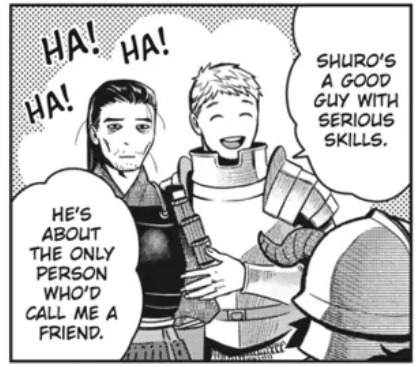
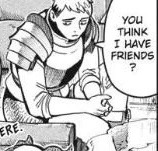
Like it’s not "just" about oh his friend liking him less than he thought, THAT IS SO MUCH. It’s a bond he thought he had being a lie it’s all the time and moments spent together either being a lie from his perspective or marred now looking back. It’s not only being upset at Toshiro for lying but upset at himself that he’s so easy to fool, it’s being upset that there’s something so wrong with you that you can’t even tell if your "close buddy" even actually likes you or not, it’s like. Holding my head. He can’t trust his own vision of events that happened do you see. There’s always this film of distrust that it could be a lie that should be there when he interacts with people there’s always this sense of cloak and dagger to expect backstabs out of nowhere because you CAN’T see it coming you CAN’T you CAN’T there’s something about you which makes it impossible so you CAN’T-

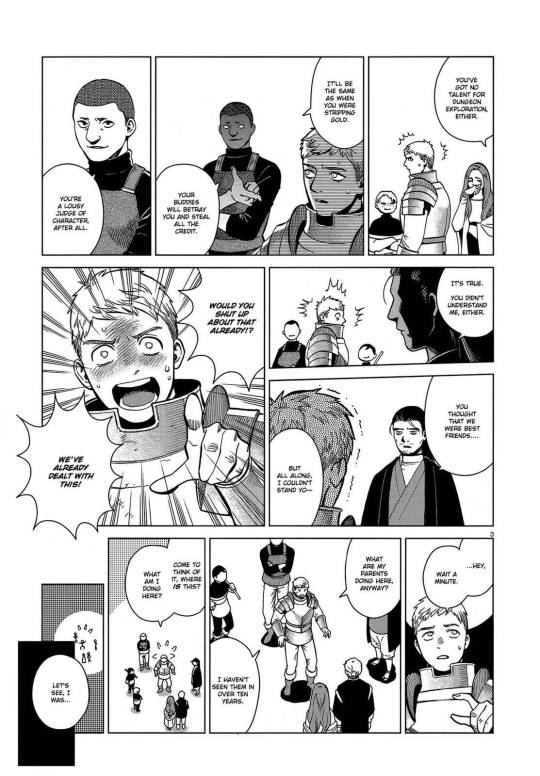
He’s so scared of not being able to read people. He knows it’s a weak spot he has, he’s always known. All of these bits are centered around social expectations and betrayals, the assumption that he doesn’t belong either in society or with other humans.
And Laios’ level of awareness is actually sort of complex to analyze, but it’s there, there’s how out of him and Falin he was the one sensitive to the ~aura of hatred~ he felt from the townspeople, there’s of course his nightmares whispering to him about the mocking looks, and how yeah actually he realizes that his gold stripper coworker was taking advantage of him. There’s of course the Winged Lion speech about his trauma and how he fundamentally mistrusts/dislikes humans to some deep seated degree, this distrust that he still keeps under control always. There’s how pre-canon he often wanted to suggest eating monsters but never worked up the courage to bring it up with the others. There’s how he gets across as stoic when he isn’t being enthusiastic…… We don’t know how aware and wary he is exactly in the moment but we do know he has some anxiety around social stuff, and looking back he does notice and aughh augh, the sense you have to hide yourself to not get hurt and be on your guard and shit and.
When you don’t know what to look out for and when to look out for it, the general ‘common sense’ of not always trusting people or noticing when someone’s messing with you becomes hypervigilance in social settings
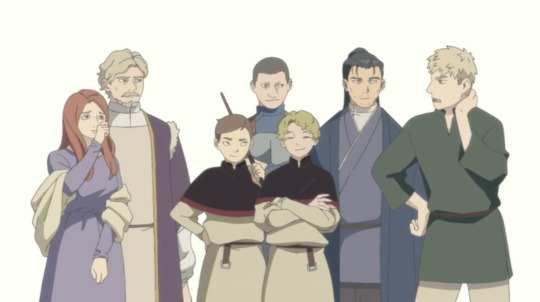
"Man they really know what you hate huh". Being socially unaware literally plagues him, he knows, he knows it so well.
It’s so quick that it’s almost hard to digest how literal and blatant Laios summoning his monster to crush all the people who’ve hurt him is. His literal go-to coping mechanism for comfort in his literal monster-induced emotionally intense nightmares, saving him by taking away the upsetting element (the humans)
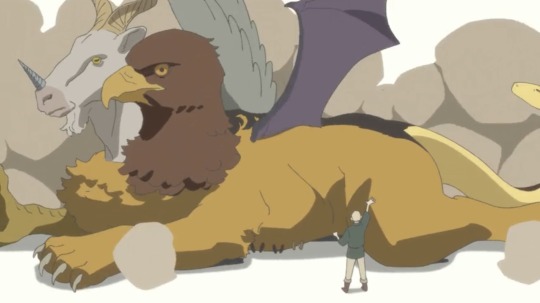
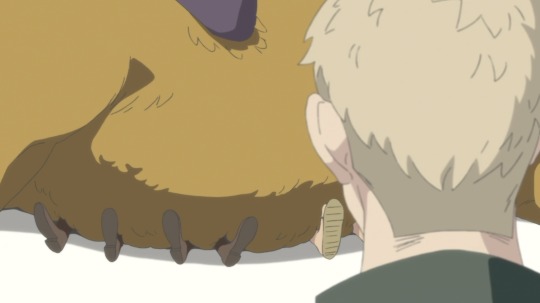
"Monsters are his coping fantasy, where they can whisk him away from humanity, all the hurt it’s caused him and its arbitrary rules" with the subtlety of a brick. Monsters are his comfort safe zone "because they kill humans" yes but no it’s because he pits them as the guardians against humans who to him are in the role of the agressors. To him they represent freedom from the shackles of what it means to be part of humanity, a fundamentally social species
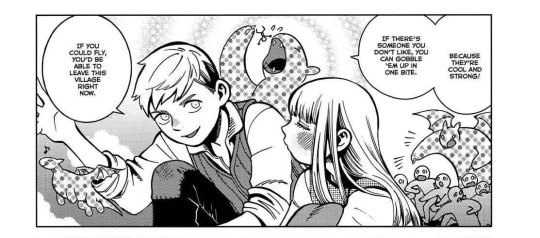
#Fumi rambles#Was asked to post this but a lot of this is present in my shuro-Laios fight analysis from Laios’ pov#Bite sized fumi#Laios touden#Meta#happy nightmare chapter day#Character analysis#Spoilers#dungeon meshi manga spoilers#And humanity being a social species is ofc ultimately not shown as a negative.#Dunmeshi is about unity and coming together when seeking to understand that which you do not!!!#But yeah like imagine if you will that you can never really trust your own perspective of events because you literally can’t tell#Wether the person likes you or hates you and you just can’t tell. Even when they ARE being obvious about it#The nightmare scene is so real like I def have vivid memories where I’m like ‘Ah yeah they cringed here#that should have been a dead giveaway’. It wears on self-esteem and self-trust. Like “you don’t belong in society” in a way they’re#sorta like factually not wrong and like. Oh ok man. Sitting down#Just spitballing here obvi. Personal experience. Hey did you guys know that dunmeshi is good. Man. It’s good#Dungeon meshi#Analysis#Feeling The Owl House Gus meltdown episode in tha club tonight#Sobbing about how the flashbacks we see of Laios’ childhood are only happy when it centers around Falin or the dogs
609 notes
·
View notes
Text
im genuinely fatigued by male heroism in literature. no i do not want a "girl-coded" villain with floppy dark hair, i want an interesting FEMALE CHARACTER GOODDDAAMMNITTTT.
I want to see an eldest daughter fighting for her family's honor. I want to see a girl facing a moral dilemma prematurely, abandoned and decieved by everyone she trusted. I want to see her revolt at the betrayal of her superiors. I want a mother to see what a monster her child has become. becoming a fugitive from her own spawn. I want to see an old woman watch those she loves die because they did not heed her warnings. I want to see old prophetesses outsmart authorities and fight to stop the inevitable. i want a bunch of sisters braving the wild because they are the only hope of a small town. a pathetic heroine who only survives because of luck and charm. young girls with strong limbs because they're used to working in factories and farms, who can run far and leap over fallen trees. who can bat a ball and scale a wall. i want girl gangs, where teenage girls get up to no good until the consequences catch up to them, or not. i want socially awkward queens who lean on the advice of aunty-like advisors, be they witches or muggle. i want to see an older sister be betrayed by the brother she raised and it climaxes in a duel. i want to see the reverse, where the brother she raised becomes her second-in-command, strong and wise because of her and wouldn't betray her for the world. i want genius little girls that are kept in secret towers because of their prophetic dreams. who terrify kings because of their intellect. i want female spies and soldiers who are stupid and devoted. i want an arrogant heroine who gets caught up in a plot bigger than she can handle. a kind girl who inevitably breaks the world and destroys everything. i want her to be destined for doom and glory. I WANT HER TO SELF-DESTRUCT IN THE FACE OF HER OWN POWER. I WANT HER DREAMS AND HOPES FOR THE FUTURE TO INSPIRE A NATION TO CHANGE, ONLY FOR HER TO LEARN THE HARD TRUTH OF THE COST OF TRANSFORMATION. I WANT HER TO WRESTLE WITH THE ISOLATION THAT COMES FROM GREATNESS. TO DESIRE LOVE AND BE TOO SHREWD TO FALL FOR IT.
I AM SO FUCKING TIRED OF BOY ANGST YOU WILL NEVER BE AS DEEP, COMPLEX OR NUANCED AS A GIRL YOU DON'T UNDERSTAND THE HORRORS YOU'RE JUST A PARODY OF WOMEN'S LIVES GET OUT
#mine#rant#fiction#writeblr#feminism#writing female characters#i keep adding shit because there's so much
1K notes
·
View notes